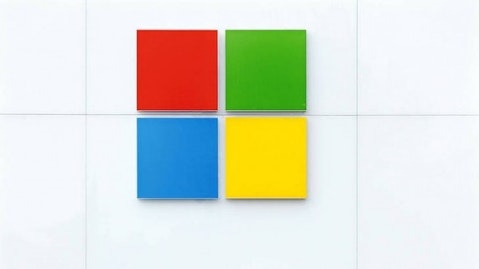It wasn’t long ago when Apple Inc. (NASDAQ:AAPL) launched the quirky ad campaign “Mac vs. PC” to get people excited about Macs over the industry-standard PC’s. The ads featured a “Mac,” represented by a young guy in casual clothing and jeans, talking about creative software features like iMovie, Photo Booth, and other neat features. The “PC” was played by a nerdy type in a business suit who would only talk about numbers or how great its Office software was.
The message was that Apple Inc. (NASDAQ:AAPL) is for fun, Microsoft Corporation (NASDAQ:MSFT) for work, and it was a tactic that helped endear Apple to a younger, more creative crowd. Now, as Macbooks and iPads are almost as prevalent as PCs and Notebook computers, Apple is now trying to put on the business suit and directly compete with Microsoft Corporation (NASDAQ:MSFT) in the boardroom.
iWorks
At Apple’s Worldwide Developers Conferwence (WWDC) on June 10, what some reporters might have missed amid all the hype of an iOS upgrade and the new iRadio was that Apple’s office software, iWork, will soon be available on Chrome, Safari, and Internet Explorer via iCloud. Also, thanks to the same cloud, documents can be sent from iWork to MS Office for editing and publishing.
This comes when Apple Inc. (NASDAQ:AAPL)’s iWork had been considered a lackluster copy of Office, largely to a lack of features, not to mention the fact that business users have been trained on Office. As a result, few people used iWork seriously, especially when Office was available to Mac users.
Mobile market
Yet times have changed, and the landscape of the tech world has changed with it. Tablets are becoming increasingly common among workers, and there is now a demand for tablet friendly office software, which iWork can supply within its extensive Apple ecosystem. This is an under-appreciated move by Apple because it gives iWork a chance to be used as office software.
Microsoft Corporation (NASDAQ:MSFT) seems to be well aware of this push by Apple, and tried to counter with a version of MS Office available in its App Store. While an important step in expanding its range, the app has two huge flaws. The first is the fact that the app is only available to Office 365 subscribers. The second is that it isn’t iPad compatible.
Experts say there is little expectation that people will buy Office 365 just to use the app, mainly because Office 365 costs $10/month or $100/year, depending on the type of subscription. Its main selling point is the ability to use SkyDrive to share documents and 60 minutes of free Skype calls. Neither of these are strong marketing points as iCloud is generally free and there are free ways to use Skype.
More competition
Adding to Microsoft Corporation (NASDAQ:MSFT)’s threatened reign is the Google Inc (NASDAQ:GOOG) office work software, Google Docs. This already comes with Google Drive and can access any Google Inc (NASDAQ:GOOG) service a user is plugged into. Expanding into Docs has been a learning curve for Google, but with the recent development of Drafts, a word processing program that saves drafts of work along with all edits and revisions, Google is becoming more appreciated by professional bloggers and writers looking to increase group interaction on specific projects.
Now, some feel its better than Microsoft Corporation (NASDAQ:MSFT) or Apple offerings, as it just needs a Google Inc (NASDAQ:GOOG) account for access and it comes with the Google cloud service. Others feel it comes the closest to Office in terms of being user-friendly, which gives it a massive advantage.
Interconnectivity
Given the developments between Apple’s iWork, Google Docs, and Microsoft Office, it seems that it isn’t the differences that matter most, but more the interconnectivity. Each of these products are available on the companies’ web browsers, but Google’s cloud is the most developed out of the three. And that’s because Office still has problems moving into mobile media and iWork is still trying to gain traction.
The main investment advice that can be taken from this is more about the value of free versus a pay service. With Google Drive, the features come simply via a Google+ account, and the Office like software works the same basic way as Apple and Microsoft products. This would represent a huge blow to Microsoft in terms of lost revenue from its main client pool.
The numbers
As a result, buying into Google could be a solid move. It has a cheap forward P/E of 16.52, and a high profit margin of close to 25%. Many analysts feel adding business software will help get Google get to the next level.
Apple might be cheaper with a forward P/E of 9.45 and a healthy ROE of 33%. Another plus is that Apple’s iWork is but a small part of its vast ecosystem. And that means its failure won’t have as much of an impact on its top or bottom line.
Microsoft Corporation (NASDAQ:MSFT) will be most affected by any shake-up in the business software industry. It relies on Office, it’s the crown jewel. And anything that messes with it, could mess with the stocks price.
Foolish final thoughts
Microsoft has always been a leader in business communications, and the fact that it took this long to come out with an Office app is a bit surprising. With Google and Apple coming hard, Microsoft Corporation (NASDAQ:MSFT) must get back to the drawing board if it wants to remain the king of business software.
The article Microsoft: King of the Office? originally appeared on Fool.com and is written by John McKenna.
John McKenna has no position in any stocks mentioned. The Motley Fool recommends Apple and Google. The Motley Fool owns shares of Apple, Google, and Microsoft. John is a member of The Motley Fool Blog Network — entries represent the personal opinion of the blogger and are not formally edited.
Copyright © 1995 – 2013 The Motley Fool, LLC. All rights reserved. The Motley Fool has a disclosure policy.






